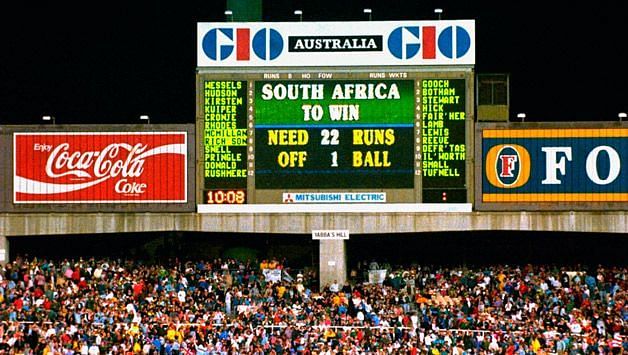
South Africa - The stepchild of the World Cup
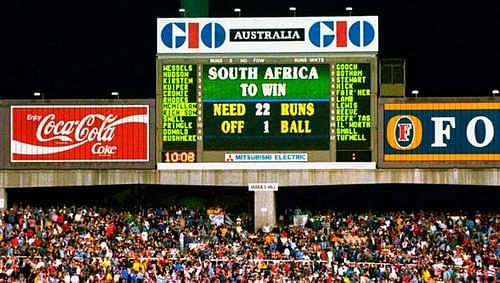
In 1975, cricket was all set to take an exponential leap, as the International Cricket Council (ICC) organised the inaugural Cricket World Cup, with 8 nations battling it out among themselves to be crowned World Champions.
The tournament was an epoch-making event in the history of the game and has now become the marquee event of the sport, a platform where heroes are born and success stories are written.
West Indies were the first to win and defend it; Australia conquered it; India, Pakistan and Sri Lanka captured it to make Asia a cricket crazy region. Over a course of 43 years, the format, jerseys, balls and conditions changed, but one thing has remained the same - the misfortune of South Africa at the World Cup.
The rainbow nation has been a breeding ground for prodigies right through the 20th century. The rich legacy of Graeme Pollock, Mike Procter, Eddie Barlow, Jimmy Sinclair and Reggie Schwarz was inherited and taken to new heights by Allan Donald, Shaun Pollock, Lance Klusener, Graeme Smith, AB de Villiers, Hashim Amla and Dale Steyn - who are some of the best names to have embraced the game.
South Africa is the only team to be ranked No.1 in all formats at the same time. Yet, the curious case of the Proteas is such that 5.6 million people still crave for cricket's most coveted silverware.
South Africa made their debut in the cricketing extravaganza in the 1992 World Cup Down Under, after being ruled out earlier due to apartheid. The team led by Kepler Wessels, including the likes of Allan Donald, Hansie Cronje and Jonty Rhodes were at the brink of knocking the doors of history, and perhaps even rewriting it, until their campaign was heartbreakingly halted by rain.
In the semi-final against England, South Africa needed 22 runs off 13 balls. Things were falling in place for South Africa, but destiny had other plans, as the rain stopped the game for 10 minutes.
When the players took the field again, the Proteas were required to get an impossible 22 runs of 1 ball, in one of the most anti-climatic and ridiculous finishes to a cricket game. This was just the start of the affair between South Africa and World Cup heartbreaks.
In 1996, South Africa came into the marquee event under a new flag and a new captain in Hansie Cronje. They were off to a flyer, winning all 5 group games. This time around, the Proteas made an error of judgement, dropping their premier pacer Allan Donald in favour of spinner Paul Adams on a seamer's paradise in Karachi. Brian Lara feasted upon the bowling attack, as South Africa were ousted in the quarterfinals.
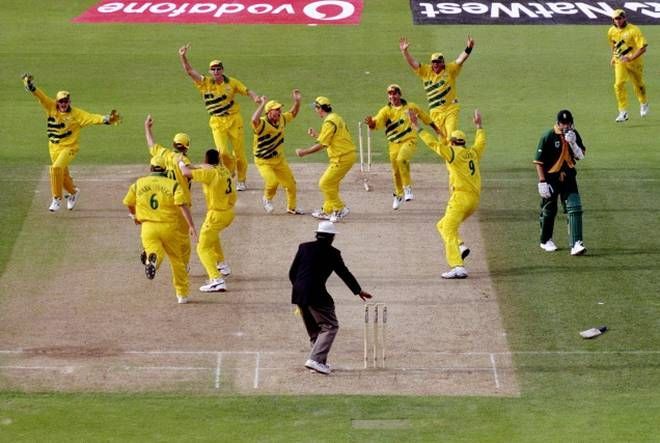
The 1999 World Cup was perhaps as disappointing for the Proteas as their debut campaign. However, on this occasion they had themselves to blame, for two moments of adrenaline rushes from Gibbs and Donald were enough to bring an end to their campaign.
Herschelle Gibbs created a mess of captain Steve Waugh's catch in the attempt of a celebratory flick, which cost his team in the Super Six stage. The two powerhouses locked horns once again in the semifinals, a thriller that went right down to the wire. It all came down to that last over, perhaps the most wretched one in the history of South African cricket.
Lance Klusener, who was unarguably in the form of his life was up against Damien Fleming, with 9 needed off 6. The southpaw hit two thunderous boundaries to the covers to get the scores level. But, a South African victory was not to be as Allan Donald at the non-striker's end initially ran for a suicidal single and did not respond to his partner's call in the next delivery, leading Proteas' ouster from the tournament.
Australia advanced to the final on account of a superior finish in the Super Six, potentially due to that cursed drop. A generation's dream was shattered. This incident translated the South Africans' image from champions to chokers, a tag which denies to shrug off the team's image even today.
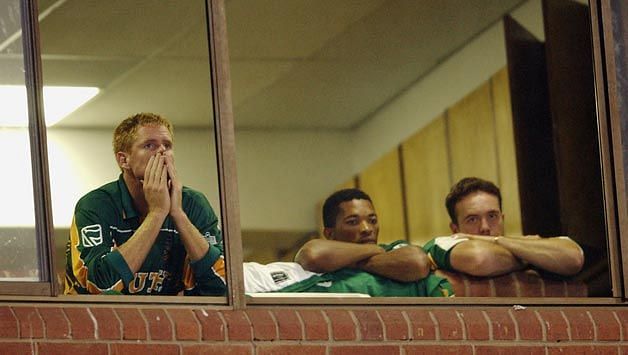
It was believed that the African nation would fare better in the 2003 World Cup, which was being co-hosted by them. However, they were reminded of the ghosts of 1992 and 1999, as a tied game once again led to their ouster.
South Africa were let down by the erratic D/L calculation and ended up getting the par score. The rain gods had once again checked their progress, and SA were ruled out in the group stage itself at their home.
World Cup ventured into the American territory in 2007 but did not bring about a change in fortunes for the rainbow nation, as they faltered again towards the business end of the tournament, once again at the hands of the Aussies, as their batting failed to click.
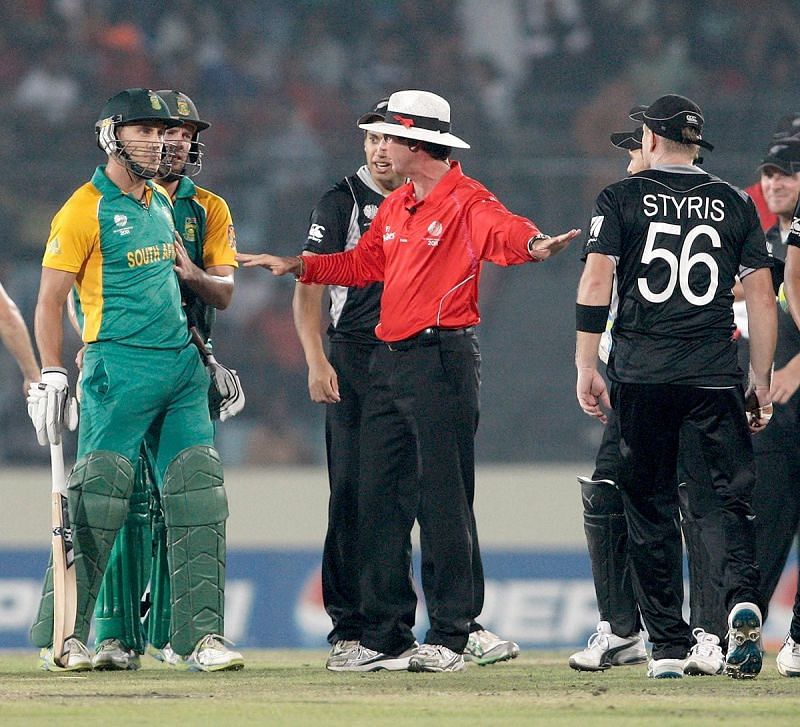
The Proteas showed a lot of promise in the initial phase of the 2011 edition as well, topping the group stage, along with a high-pressure win over co-hosts India. However, they failed to win a knockout game for the umpteenth time, as they succumbed at the hands of an out-of-form Kiwi side, failing to chase a mediocre 227 after being in the driver's seat at one point.
The fall of Kallis triggered a dismal collapse, as SA lost 8 wickets for 64 runs.
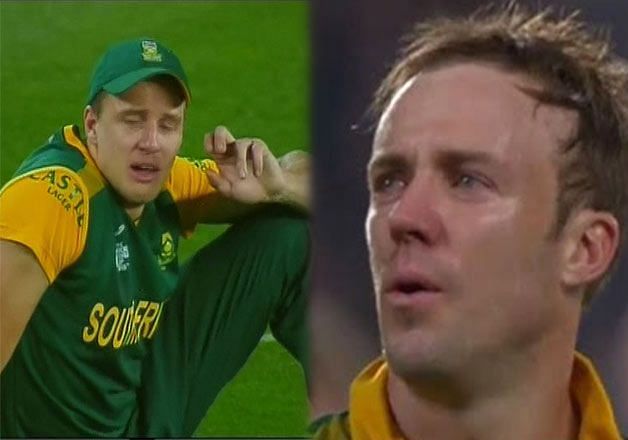
With the golden generation of Smith and Kallis bidding adieu to cricket, the onus was on superman ABD to shrug off the chokers' tag and steer his team to the zenith of world cricket. History repeated itself in a match that was marred by racial controversies prior to its commencement. Just when the South African innings seemed to gather momentum, the heavens opened and restricted the flow of ABD and du Plessis.
The Proteas had themselves to blame as well, with uncharacteristic fielding errors, including a crucial run out missed by the captain himself. As Dale Steyn was smacked over long on by Grant Elliot, this time even the cricketers could not control their emotions, and the scenes left thousands of fans across the globe teary-eyed. It was yet another instance of so close, yet so far for the South Africans.
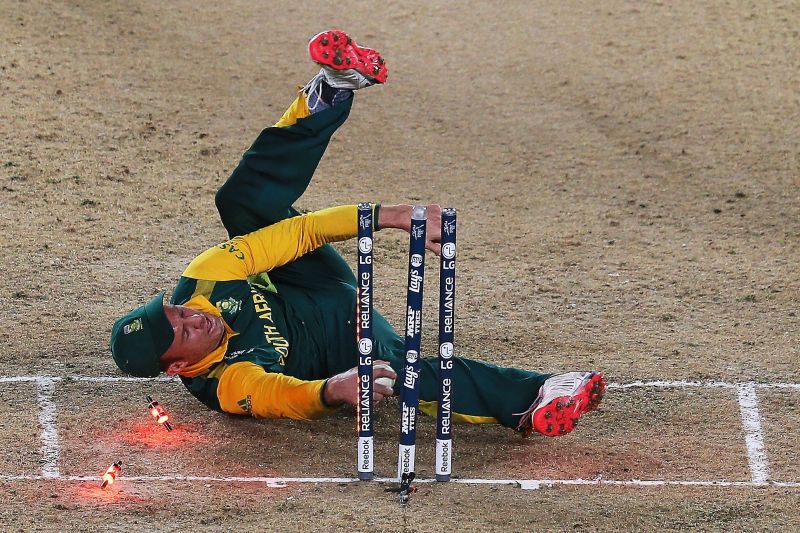
A journey which began Down Under and has come to a temporary standstill on the same lands, South Africa's World Cup campaign is one of the most beguiling yet baffling stories of cricket.
A team has been a part of one of the most prolific games in the history of cricket, gunning down a world-record 438 in a series decider against Australia. A nation that has produced the best all-rounder of the modern era - Jacques Kallis. Shaun Pollock, Morne Morkel and Dale Steyn boast of the ability to run through any batting order.
The batting prowess of AB de Villiers and Hashim Amla is unchallenged, while it is a herculean task to find a leader like Graeme Smith. Yet, it is ironical that Gary Kirsten remains the only South African to win the World Cup - as the Indian coach in 2011.
It is extremely perplexing that how a team with all areas covered and most of the above players mentioned sharing the dressing room on various occasions failed to fire when it mattered the most.